25 Section 3-1
Kapitel 3
In Chapter 2, you continued your study of verbs by learning about stem-changing verbs. You used the stem-changing verb geben, in the expression “es gibt,” which means “there is” or “there are.”
Es gibt einen Fluss in Nordalabama. (There is a river in North Alabama.)
Es gibt ein Meer im Süden. (There is a sea in the south.)
We can also use the verb haben to describe what landmarks certain areas have.
Unsere Stadt hat einen See. (Our city has a lake.)
Das Land hat viele Hügel. (The country has many hills.)
Remember! The direct object, the noun that follows the verb, must be in the accusative case! (i.e. masculine adds –en to the definite or indefinite article.)

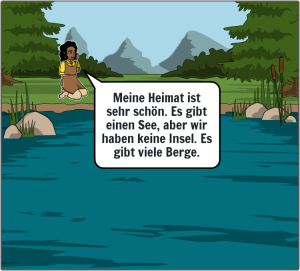
Ex. A: Beschreiben Sie Ihre Heimat! Describe your homeland. What landscape features are there? Use the verb haben and the expression es gibt to write at least five sentences.
EXTRA PRACTICE with landmarks:
- https://www.germanzone.org/articles-ein-kein-1-geographie/
- https://www.germanzone.org/noun-plural-forms-2-geographie/
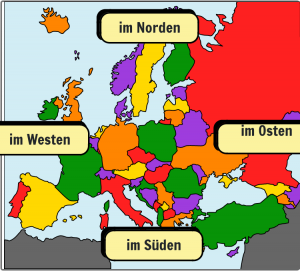
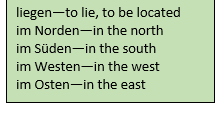
Ex. B: Wo liegt…? Using a map of Europe, describe where these countries are located.
Beispiel:
A: Wo liegt Spanien?
B: Spanien liegt im Westen von Europa.
- Finnland
- Berlin
- die Nordsee
- Italien
- der Rhein
- die Alpen (plural!)
- Kreta
- die Donau
![]()
Quick Listening: Listen to Johannes, AudioLingua, talk about Germany. You will hear several new landscape and directional words from this chapter. You won’t understand everything, but read the questions and answers first and then listen to the audio again.
![]()
Quick Listening: Listen to Fabian, AudioLingua, talk about the city Stuttgart. You will hear several landscape and directional words from this chapter. You might not understand everything, but listen for key words.
Ex. C: Nicos Weg. Episode 19: In Europa. Watch episode 19 of Nicos Weg and do the online activities. You will review word order and the indefinite pronoun “man.” Don’t forget that German word order can vary as long as the verb comes in second position.
https://learngerman.dw.com/en/in-europa/l-37328492
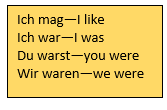
- Man isst Pizza in Italien.
- Pizza isst man in Italien.
- In Italien isst man Pizza.
Note–the verb still comes second!
https://learngerman.dw.com/en/in-europa/l-37328492
EXTRA PRACTICE:
Want to test your German knowledge of Geography? Go to germanzone.org’s website and to see how much you already know.
Ex. D: Nicos Weg. Episode 20: Andere Länder. Watch the video and do the online activities. You will review the stem-changing verb sprechen, to speak. Don’t forget that its stem changes from “e” to “i” at the du and er/sie/es forms.
https://learngerman.dw.com/en/andere-l%C3%A4nder/l-37337244
3.1: Imperativ
In this chapter, you will continue using the same verbs you learned in chapters 1 and 2 to make commands. With the imperative, you can tell people to do things.
Englische Beispiele:
- Go home!
- Do your homework!
- Drink more water!
In all of these examples, the verb comes first. Similarly, the verb comes first in German commands.
Deutsche Beispiele:
- Gehen Sie nach Hause!
- Machen Sie Ihre Hausaufgaben!
- Trinken Sie mehr Wasser!

*probieren—to try something (food, a new sport, hobby, etc.)
Because German has different words for “you” that imply different levels of acquaintance, i.e. du vs. Sie vs. ihr, there will be different forms of commands. We will begin with Sie commands.
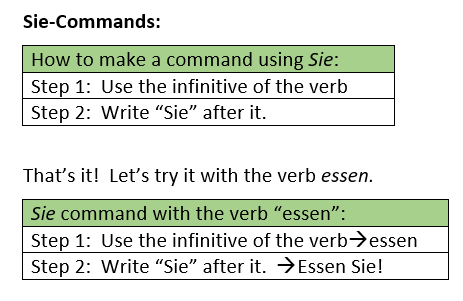
The good news is that there is only one verb with an irregular imperative form: sein–to be.
Sie imperative for sein: Seien Sie!
- Seien Sie glücklich! (Be happy!)
- Seien Sie optimistisch! (Be optimistic!)
- Seien Sie nicht so pessimistisch! (Don’t be so pessimistic!)
Video. Click to see me reteaching imperative for “Sie.”
Check out Dr. Claudia Kost’s (University of Alberta) matching activity with polite commands:
Ex. F: Guter Rat. Read the following situations and respond with appropriate advice in the form of a Sie command. Bonus: Give more than one command as advice!
Beispiel: Ich bin müde.
→Schlafen Sie!



How to soften a command:
Sometimes, a command can sound a little too direct. If you want to soften a command and not sound so authoritarian, you can add the word doch or mal. Doch and mal are flavoring particles that can soften a command to make it sound more like a suggestion. As always, you can always add bitte, please, to make a command not so direct.
- Trinken Sie doch mehr Wasser! (You should) drink more water.
- Probieren Sie mal den italienischen Kuchen! Just try the Italian cake!
- Gehen Sie bitte ins Bett. Du siehst müde aus. Please go to bed. You look tired.

Negative Commands:
In order to make a command negative, all you have to do is negate it with nicht or kein. In Chapter 1, you learned that to negate adjectives or adverbs, we use the word nicht in front of them.
- Ich bin nicht pessimistisch! (I am not pessimistic!)
To negate direct objects, nicht comes after the direct object.
- Ich kaufe den Computer nicht. (I’m not buying the computer.)
To negate a prepositional phrase, nicht comes before the preposition.
- Ich bleibe nicht in Spanien. (I’m not staying in Spain.)
To negate indefinite articles, aka forms of the word ein–, we add a “k” to make it kein-.
- Ich esse keine Schokolade. (I eat no chocolate.)
To negate a command, we will use these same rules.
- Seien Sie nicht so pessimistisch! (Don’t be so pessimistic!)
- Kaufen Sie den Computer nicht! (Don’t buy the computer!)
- Bleiben Sie nicht in Spanien! (Don’t stay in Spain!)
- Essen Sie keine Schokolade! (Don’t eat any chocolate!)
To soften these commands, add the flavoring particle mal. Flavoring particles have no English equivalent, but they do change the feeling of the command.
- Essen Sie mal keine Schokolade! (Mal softens the command.)
To try to persuade someone with your command, you can add the flavoring particle doch.
- Seien Sie doch nicht so pessimistisch! (Doch tries to convince!)
- Bleiben Sie doch nicht in Spanien!
And, as always, it never hurts to use the word bitte, please, in a command.
- Kaufen Sie den Computer bitte nicht!
Ex. G: Bitte nicht! Using the cues, make negative commands to tell your partner not to do the following things.
Beispiel: sein/faul
→Seien Sie nicht faul!
- schwimmen/am Montag
- wohnen/in Tokio
- tanzen/in der Disco
- singen/Rap-Musik
- tragen/Jacke
- kochen/Suppe
- lesen/Zeitung
- fragen/Professor
- fliegen/nach Russland
Ex. H: Touristen. You have just met a German tourist in your area who wants to know what he should do here. You may want to use some of the landmarks at the beginning of the chapter.
- Use the polite imperative (since you’re talking to a stranger).
- Use flavoring particles doch and mal.
- Use both positive and negative commands.
Beispiel: Essen Sie doch bei Ricatonis. Essen Sie nicht bei McDonalds.
Ex. I: Auf Deutsch! Translate the following commands into German, using the Sie-imperative. Add flavoring particles as necessary.
- Swim faster!

- Don’t work so long!
- Ask your professor.
- Read the newspaper.
- Speak louder!
- Don’t drive so fast!
- Don’t sleep so late!
- Stay home today.
- Wait here.
Wir-Imperativ: Let’s _________!
We can also form the imperative with the wir-form of the verb. In English, this translates to the “let’s” form.
- Let’s eat!
- Let’s discuss the problem.
- Let’s earn some money.
To make this form in German, we put the verb first and THEN the pronoun wir.
- Essen wir!
- Besprechen wir das Problem.
- Verdienen wir Geld.
Wir-imperative: INFINITIVE + WIR.
Just like Sie-Commands, there is only one verb that is irregular—sein.
- Seien wir nicht so kritisch! (Let’s not be so critical!)
- Seien wir pünktlich. (Let’s be punctual.)
Video. Click the link to watch me reteaching “let’s” commands.

Let’s Go…. „Gehen wir ________.“
You can combine several verbs together with the verb gehen, especially when using the wir-imperative.
Often, you will see verbs listed together with gehen.
- schwimmen gehen—to go swimming
- tanzen gehen—to go dancing
- einkaufen gehen—to go shopping
To make a wir-command out of them, we will conjugate the last verb.
- Gehen wir schwimmen! Let’s go swimming!
- Gehen wir tanzen! Let’s go dancing!
- Gehen wir einkaufen! Let’s go shopping!
You might see phrases listed like this as well with a noun or prepositional phrase in front and a verb infinitive after it.
- Fußball spielen—to play soccer
- ins Bett gehen—to go to bed
- Musik hören—to listen to music
Make sure to conjugate the verb and put the rest of the phrase after that.
- Die Kinder spielen Fußball. The children are playing soccer.
- Du gehst ins Bett. You’re going to bed.
- Markus hört Musik. Markus is listening to music.
Ex. J: Machen wir das! With a partner, take turns suggesting that you do the following activities, using the wir-imperative.
Beispiel: schwimmen gehen
A: Gehen wir schwimmen! (Let’s go swimming!)
B: Ja, machen wir das! (Yes, let’s do that!)
ODER
B: Nein, lieber nicht. (No, I’d rather not.)

- Nudeln kochen
- ins Restaurant gehen
- Karaoke singen
- spazieren gehen
- die Landschaft malen
- Fotos machen
- nach Hause laufen
- mit den Haien surfen
- eine Pizza bestellen
Ex. K: Wir planen eine Party! Sie planen eine Party mit Ihren Freunden. Machen Sie viele Vorschläge mit dem Imperativ.![]()
Beispiel: Bestellen wir Pizza!
Ex. L: Auf Deutsch! Übersetzen Sie ins Deutsche!
- Let’s play tennis!

- Let’s work at home today.
- Let’s order chicken and a salad.
- Let’s visit our grandparents.
- Let’s not wait here.
- Let’s go shopping!
- Let’s go jogging.
- Let’s not stay in Europe.
- Let’s be healthy!
Video: We now interrupt this section on the imperative to suggest the following Easy German video on gestures in German! The first few are similar to English.
Ex. M: Video. Nicos Weg. Episode 21: Was ist das? Watch episode 21 and do the online activities. You will review how to form plurals, which you learned in Chapter 1.
https://learngerman.dw.com/en/was-ist-das/l-37368285
Du Commands:
When giving a command to someone that you know very well and to whom you would normally say “du,” you will need to form the commands differently. The good news is that the “du” form of commands is very close to how we form them in English, i.e., with only the verb.
Geh nach Hause! (Go home!)
Kauf das Brot. (Buy the bread.)
Halt! (Stop!)
Schlaf nicht so lange. (Don’t sleep so long.)
Sei doch nicht so spät! (Don’t be so late!)
Notice that we use the verb stem to form the du-command. Just like in English, the verb should come first.
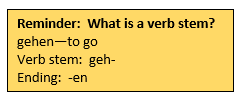
Geh nach Hause! (geh-en)
Kauf das Brot. (kauf-en)
Halt! (halt-en)
Schlaf nicht so lange. (schlaf-en)
Sei doch nicht so spät! (sei-n)
Also notice that, unlike Sie commands, we don’t use the word “du.”
If the verb stem ends in -d- or -t-, it often adds an “e” to the end of the command.
Arbeite! (Work!)
Finde die Kinder. (Find the children.)
Warte auf mich! (Wait for me!)
…HOWEVER, in everyday speech, it sometimes gets dropped.
Wart’ auf mich!

Ex. N: Mach das! Roleplay: You are a babysitter for a young child. Tell him what to do, using the du-imperative. Don’t forget that you can always add the flavoring particles doch and mal, as well as bitte.
Beispiel: eine Jacke tragen
→Trag doch eine Jacke!
- Hausaufgaben machen
- ins Bett gehen
- Milch trinken
- lernen
- hier bleiben
- die Katze suchen
- halten
- schlafen
- warten
Ex. O: Auf Deutsch! Übersetzen Sie ins Deutsche!
- Drive home.
- Don’t sleep so long.
- Please wait here.
- Go swimming.
- Don’t come home so late.
- Don’t be so lazy.
- Dance!
- Cook something.
- Don’t travel to Cuba.
Ex. P: Ich habe ein Problem. Give advice, using the du-imperative.



Listen to Faun’s song Tanz mir mir, 2013, to hear some du-commands.
Wilhelmine’s song, Komm wie du bist, 2020, also has examples of du-imperative in it.
Text: https://genius.com/Wilhelmine-komm-wie-du-bist-lyrics
In Chapter 2, you learned about stem-changing verbs, such as lesen and nehmen, whose stems change from e→i or ie. The stems of these verbs also change when conjugated…but only for du and er/sie/es.
Du liest die Zeitung. (e→ie)
Er nimmt das Schnitzel mit Pommes frites. (e→i)
To make an informal command, you will need to keep this stem-change. In the chart below, you can compare the infinitive with the conjugated form and finally the command form.

Lies keine Comichefte. (Don’t read any comic books.)
To sum it up, the command should not have the –st verb ending on it.


In Chapter 2, you also learned about stem-changing verbs that change from a→ä. The good news is that these verbs don’t change the stem when forming the du-imperative.
Fahr doch nicht so schnell! (Don’t drive so fast!)
Lauf mal nach Hause. (Run home.)
Schlaf doch nicht so lange! (Don’t sleep so long!)
Video. Click to watch me reteaching the du-imperative.
Watch YourGermanTeacher’s video to see a review of the difference between the du-imperative and Sie-imperative:
Ex. Q: Mach es heute! Your friend says she will do the following things later. Using the informal imperative, tell her to do them today.
Beispiel: Ich koche die Suppe am Freitag.
→Koch die Suppe doch heute!
- Ich arbeite morgen.
- Ich gehe am Donnerstag spazieren.
- Ich lerne für das Quiz nächste Woche.
- Ich mache meine Hausaufgaben am Sonntag.
- Ich esse gesund am Wochenende.
- Ich lese den Roman nächste Woche.
- Ich gehe am Donnerstag einkaufen.
- Ich fahre am Mittwoch zu Emma.
- Ich repariere den Computer nächsten Monat.
Ex. R: Guter Rat. You meet an incoming freshman who knows nothing about life at UNA. Using the imperative, give him tips on what to do and what NOT to do.
Beispiel:
Lern Deutsch!
Iss nicht bei McDonalds!…usw.
EXTRA PRACTICE with du-commands. (Courtesy of Claudia Kost & Crystal Sawatzky, University of Alberta.)
Ex. S: Video. Nicos Weg. Episode 22: Wem gehört das? Watch episode 22 and do the online activities. You will review indefinite articles and noun plurals, which you learned in Chapter 1.

https://learngerman.dw.com/en/wem-geh%C3%B6rt-das/l-37372077
Ihr Imperative:
To give a command to two or more people who you know very well, i.e. friends, classmates, family, you will form the imperative from the ihr-conjugation of the verb. Just like English, the verb will come first, and the word “ihr” will not be included.
Step 1: Conjugate the verb for “ihr”→ihr geht
Step 2: Get rid of the word “ihr”→geht
Finished command: Geht!
Beispiele:
- Geht nach Hause! (Go home!)
- Sprecht doch auf Deutsch. (Speak in German!)
- Gebt mir mal den Salat. (Give me the salad.)
Don’t worry about stem-changing verbs; remember—they only stem-change at du and er/sie/es, NOT ihr.
Video. Click to see me reteaching “ihr” commands.
Or watch YourGermanTeacher’s video to see him giving lots more examples with ihr-commands. He also reviews Sie-commands for when you need to order around groups of people that you need to treat with respect.

Summary of the Imperative Mood:
|
|
du |
Sie |
ihr |
Let’s _____. |
|
How to make the command: |
verb stem; keep stem-change of e to i(e) verbs. |
infinitive + Sie |
verb conjugated for “ihr” |
infinitive + wir |
|
Example with verbs warten and sprechen: |
Wart!/Warte! Sprich! |
Warten Sie! Sprechen Sie! |
Wartet! Sprecht! |
Warten wir! Sprechen wir! |
|
Watch out! |
Don’t include “du” with the command. |
Include “Sie” with the command. |
Don’t include “ihr” with the command. |
Include “wir” with the command. |
|
Irregular verb sein |
Sei! |
Seien Sie! |
Seid! (not irregular) |
Seien wir! |
Ex. T: Der Imperativ. Fill in the table with the imperative for each verb.
|
|
du |
Sie |
ihr |
wir |
|
|
|
|
|
| 2. sagen |
|
|
|
|
| 3. schreiben |
|
|
|
|
| 4. lernen |
|
|
|
|
| 5. arbeiten |
|
|
|
|
| 6. fliegen |
|
|
|
|
| 7. tragen |
|
|
|
|
| 8. fragen |
|
|
|
|
| 9. gehen |
|
|
|
|
| 10. kommen |
|
|
|
|
| 11. spielen |
|
|
|
|
| 12. machen |
|
|
|
|
| 13. sein |
|
|
|
|
| 14. wohnen |
|
|
|
|
| 15. brauchen |
|
|
|
|
| 16. werden |
|
|
|
|
| 17. lesen |
|
|
|
|
| 18. haben |
|
|
|
|
| 19. nehmen |
|
|
|
|
| 20. sehen |
|
|
|
|
| 21. sprechen |
|
|
|
|
| 22. finden |
|
|
|
|
| 23. laufen |
|
|
|
|
| 24. schlafen |
|
|
|
|
| 25. geben |
|
|
|
|
| 26. trinken |
|
|
|
|
| 27. suchen |
|
|
|
|
| 28. bleiben |
|
|
|
|
| 29. essen |
|
|
|
|
Ex. U: Guter Rat. The people below have problems. Give them advice on how to solve their problems by using commands, aka Imperativ! (You’ll have to decide if the command should be formal or informal).
1.  Baby: “Ich bin müde!”
Baby: “Ich bin müde!”
2.  Herr Lehmann: “Ich habe keine Klamotten!”
Herr Lehmann: “Ich habe keine Klamotten!”
3.  ein Freund: “Ich habe viel Energie!”
ein Freund: “Ich habe viel Energie!”
4.  Ihre Schwester: “Ich habe viel Geld!”
Ihre Schwester: “Ich habe viel Geld!”
5.  Ihr Nachbar: “Ich vermisse meine Freunde!”
Ihr Nachbar: “Ich vermisse meine Freunde!”
Video. Watch Easy German’s video for a review of all imperative forms and many examples used in real life.
EXTRA PRACTICE:
Go to Germanzone.org’s website to do some extra practice with the imperative.
https://www.germanzone.org/imperative-mood-1/

